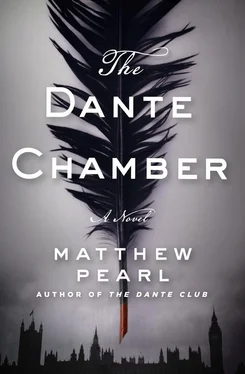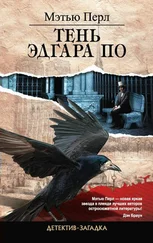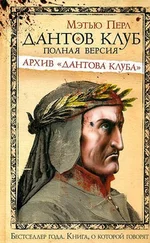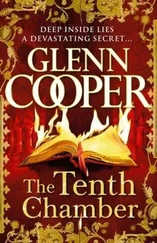It was Simon Camp, stripped naked, with the hilt of a long sword protruding from his chest. On his forehead, some of his flesh was cut and bloody. Out the window, Holmes could make out bloodstained footsteps in the snow where the assailant — barefoot, from the looks of it — had fled.
Holmes returned to inspect the body. On Camp’s forehead was not merely a random cut as it first had appeared, but a letter.
P had been carved there.
The same letter the angel guarding the gates of Purgatory carves on Dante’s brow — representing peccatum , or sin awaiting purgation.
When their train reached the station, Browning joined Branagan and the other two policemen in a carriage driven by a Lancashire constable alerted in advance by telegraph to expect them. With the roads barely passable, their journey by carriage was filled with as many stops and starts as the train ride had been. At one point, they passed an overturned carriage in the snow. (Were those books spread out in the snow nearby?) A constable had to shovel away parts of snowbanks at several junctures in order to continue. Once at the gates of the sanatorium, they saw no sign that Holmes and Tennyson had arrived. It was impossible to know for sure; if there had been another carriage there recently, any traces of wheel tracks had been covered by fresh snow. ( Unless , thought Browning... the overturned carriage? )
During their train ride, Browning had shared with the eager constable his fears that the next outburst of violence could happen at any moment. “If Sibbie is set on completing the terraces of Purgatory, there are three more beyond the ones we know they have staged: terrace five holds the Avaricious and Prodigal together; terrace six, the Gluttonous; and the final region, terrace seven, represents the cleansing of excessive love, or lust that all souls must undergo.”
“Our very presence could prompt the next death,” Browning now added as they trudged up the hill to enter the property.
“What do you mean?” Branagan asked.
“I believe that must be what happened with the death of Reuben Loring — their purgation of the Wrathful. Sibbie and Fallow pluck victims from their followers. When they heard we were on the grounds, they did not want to risk being stopped, and they wanted us to witness the demonstration.”
Browning stopped midstride.
“Mr. Browning?” Branagan said, urging him to come faster. “You look like you’ve seen a—”
“It’s Loring, Constable. I’m just remembering — we were searching for him, and after his death we assumed we inadvertently led the perpetrator to him, at the time, of course, thinking it was Gabriel we led there. But Loring saw us coming. He saw us. What if Loring was the one who knew his death had to happen quickly before it could be stopped by our presence?”
“What do you — how does that make any sense?”
It made all the sense in the world. It fit the pieces together perfectly.
Browning thought about the period of Gabriel’s life after Lizzie died when the painter-poet would talk about his thoughts of his own death, and thought back to a particular day Browning took a walk with Gabriel and a group of friends above a scenic basin of water. The place was nicknamed the Devil’s Punchbowl. Browning had noticed a look on Gabriel’s face that day, a glare in his eyes, and suddenly knew that Gabriel was, at that very moment, contemplating jumping into oblivion. The edge was slippery, and there would be no way to save him. Gabriel put his arm into Browning’s, and Browning knew why. It was Gabriel’s way to choose living. Browning knew the look and the feeling in his friend, because he had experienced the same ones after Ba died. It was the longing that struck the living to know death, to be purified and completed by it.
Browning finally answered Branagan. “Loring — and all of the others — the dying participated in these deaths, Constable. In the Inferno , Dante meets souls who fight their fate; in Purgatory, the shades embrace it, they want to be seen and known and remembered — ‘remember me, remember me,’ they’re constantly pleading — it is their way to salvation. Their only way. The victims have been accomplices in this, herded by Fallow, mesmerized by Sibbie.”
“Yes!” Branagan seemed to see it all in a flash, and shouted out to the others to hurry.
“Thirteen hundred!”
“What, Browning?”
“Thirteen hundred and 1870!” But he didn’t have time to explain.
The former textile mill — the sanatorium so removed from the chaos of the city — the otherworldly utopia: this place now conveyed a menace that Browning and the policemen feared far more than any dark, bloodstained alleyway in London.
Standing at the rear of the buildings, Ironhead Herman took a big breath. He didn’t relish the idea of this place having to disappear, however much trouble it had given him. The Phillip Sanatorium had been a valuable purchaser of their goods. It was here, at this habitat for fanatics, that the young woman and the minister who followed her orders had collected massive amounts of smuggled opium. Herman and his superiors provided so much opium to Sibbie and Fallow’s flock that, in conjunction with incidents abroad affecting the trade from India, the overall supply of opium to apothecaries and other dispensaries around London had been periodically reduced.
The drug had changed the reality of people in a way similar to the religions of old. It made the men and women who habitually used it think they were floating through fire, they were dominating the sky, instead of being crushed by the ruthless modern world surrounding them. The need for opium was as fierce as the trade for it.
Herman lifted his walking stick, topped by the grotesque golden beast head, to signal his minions, who swiftly spread out in different directions of the so-called sanatorium. Herman was, by his own assessment, a patient man. But in his way of life, an associate could quickly become a liability. An ally overnight became an example.
Herman’s team finished inserting wires into blocks of clay spread out in inconspicuous places around the buildings. He thought about the Fenian fools who had purchased phosphorus from him and built explosives that practically screamed that they did it. As Herman waited, he examined the carved head at the top of his walking stick. It was a representation of the kylin, a mythological beast that would punish the wicked with fire and destruction. The kylin was said to be able to walk on water without causing a ripple. Herman always liked that. No matter how many people were about to perish here tonight, no traces of Herman or the powerful forces he represented would remain. Herman would go on, untouched, unpunished.
Christina knelt on the ground. She had thoroughly searched the passageway that ended in a locked iron door. She’d even torn apart the platters of food looking for something she might be able to use to free herself from her chamber or to break through to Gabriel’s even grimmer compartment. But there was nothing. The only option that was left for her was the one she’d relied upon her whole life when everything around her fell apart, when family peace faltered: to pray.
Pain shot through her from her knees on the hard ground, but she did not stop. She knelt even lower, prayed harder: prayed to God that her brother would not succumb to his starvation and weakness, would find some of his lost strength that had been buried years before with Lizzie; prayed that the family curse that never quite allowed the Rossettis to feel more than exiles in London vanished without taking Gabriel with it; prayed that all the things she had given up in her life to remain devoted to God would now be brought to account.
Читать дальше












